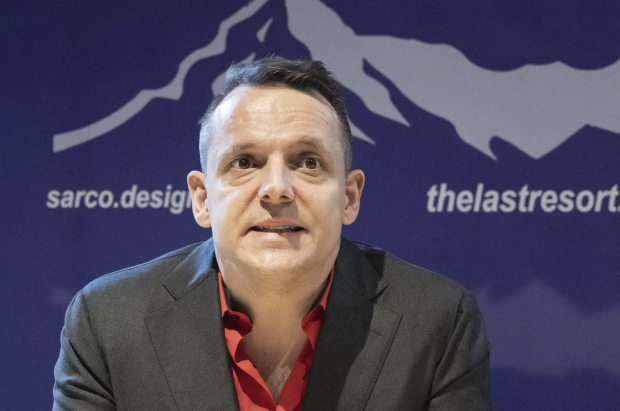November 16, 2024
Sarco Director Still in Custody
The Sarco boss is still in custody – now his lawyer is attacking the Schaffhausen authorities
The German Florian Willet is being investigated for intentional homicide in connection with the first death in the suicide capsule. Now his defense lawyer is speaking for the first time.
Simon Hehli 14.11.2024, 17.24 hrs
On September 23, a 64-year-old American woman was the first person to die in the controversial Sarco suicide capsule in a wooded area of Schaffhausen.
Only one person from The Last Resort, the organization that provided the capsule, was present: board member Florian Willet.
The police took him away and he has now been in custody for seven weeks.
Such a long period of pre-trial detention would be rather unusual if it were merely a violation of the ban on assisted suicide “for selfish motives”.
However, the Schaffhausen public prosecutor’s office is also investigating deliberate homicide: it cannot rule out the possibility that the American woman died as a result of outside influence.
This is because, according to the public prosecutor’s office, the woman was apparently found to have injuries to her neck.
Film footage documenting the events of September 23, which was analyzed by the Dutch newspaper “De Volkskrant”, is said to exonerate Willet: there is nothing to suggest that the lid of the Sarco could have been opened after the American had climbed in.
However, there are allegedly gaps in the footage – according to the Sarco people, because the cameras were only activated by movement.
In addition, there are also technical records of the oxygen concentration, which prove that the oxygen content dropped sharply when the Sarco was activated and remained at a lethal level until long after death.
This would also not have been possible if someone had opened the lid of the Sarco.
Public prosecutor’s office remains silent
Details on the alleged external influence are not available from official sources: The Schaffhausen public prosecutor’s office is shrouded in silence.
And not only to the media, but allegedly also to Florian Willet’s lawyer, Petar Hrovat. In an interview with the NZZ, he sharply criticized the procedure: “We are not being given access to the files. This is a blatant violation of the rights of the defense.”
The autopsy report is also not yet available. Hrovat claims that he does not know what evidence there might be for a deliberate killing.
However, the public prosecutor’s office itself had submitted a document stating that no DNA from Willet had been found in the neck area of the deceased.
The public prosecutor’s office would treat Willet and his lawyer like a party that is completely refusing to cooperate.
“There is no reason for this, because my client is cooperating fully and has no intention of hiding anything,” says Hrovat. Willet made detailed statements and did not object to the investigators analyzing his cell phone and tablet.
According to the Volkskrant report, the German also waited next to the Sarco for around two hours after reporting it to the police until the Schaffhausen authorities finally arrived in the wooded area.
The question arises as to whether he would have done this if he had killed the woman himself and would have had to reckon with the corresponding legal consequences.
Nitschke wanted to travel
Sarco inventor Philip Nitschke and his wife Fiona Stewart watched the premiere of the capsule from a safe distance.
However, they had offered the public prosecutor’s office the opportunity to come to Switzerland for questioning, wrote The Last Resort in a communiqué.
“This offer was declined by the public prosecutor’s office in Schaffhausen.”
Hrovat’s defense lawyer also has no sympathy for last week’s decision by the Schaffhausen compulsory measures court (ZMG): it rejected the request for release from custody.
This was despite the fact that the public prosecutor’s office had not submitted any new files compared to the hearing on September 25, at which the court had approved the pre-trial detention.
“If the public prosecutor’s office is given a completely free hand in deciding which files to submit and which not, then this is an undermining of the right to have the admissibility of pre-trial detention reviewed by a court,” says Hrovat. It is very irritating that the court does not require the prosecution to document the progress of the investigation.
Hrovat refers to the legal literature, according to which an urgent suspicion of a crime as a prerequisite for detention must generally increase in the course of the proceedings or remain sufficiently high.
According to the Basel Commentary on the Code of Criminal Procedure, an “increasingly strict standard must then be applied to the materiality and concreteness of the suspicion”.
The defense lawyer believes that these requirements have been violated in the Willet case.
How does the Supreme Court decide?
Hrovat now wants to appeal to the Schaffhausen High Court in the hope that it will revise the decision of the ZMG. If he is unsuccessful, he still has the option of taking the case to the Federal Supreme Court.
But until the Lausanne judges have made their decision, another few weeks would pass and Willet would be behind bars.
The statement that First Public Prosecutor Peter Sticher was quoted as saying in the “Frankfurter Allgemeine Zeitung” in mid-October, when he was still talking about the case of the Sarco boss, would still apply: “There are certainly no plans to let him go at the moment.”
The public prosecutor’s office does not wish to comment on the allegations made by Willet’s lawyer or on further action, as Sticher writes on request.
